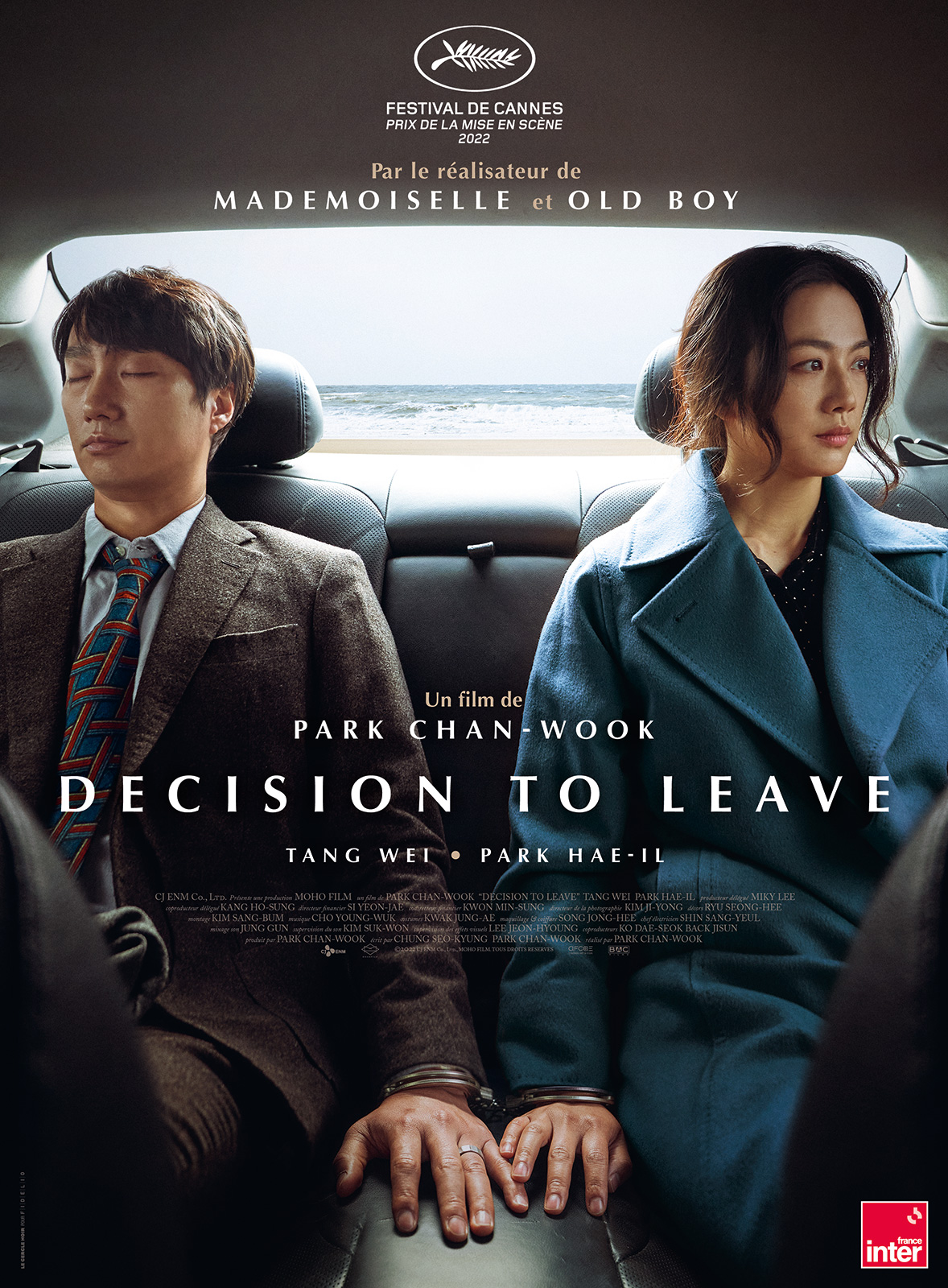If Park-Chan Wook received the Best Director Award at the 75th Cannes Film Festival in May for "Decision to Leave", it is thanks to an amalgam of elements that the film rises to the status of a masterpiece. It confirms the ability of some directors to explore new styles, to appropriate them, to consolidate drafts that other directors have already treated timidly, without really going to the end.
Synopsis
Hae-Joon, a veteran detective, investigates the suspicious death of a man on top of a mountain. Soon, he begins to suspect Sore, the wife of the deceased, while being destabilized by his attraction to her. (Critical sense) 
Comments
If the scenario could remind us from afar, from afar, the film "Basic instinct", directed by Paul Verhoeven in 1992, we understand quite quickly that it is not a story of sex or balance of power or sexual arousal because of danger, but simply a love story. Not as simple as that, certainly, but the plot becomes clearer from the moment this evidence surfaces, embarking everything else with it. If the detective seems to fall in love at first sight, Sore, voluptuous, sensual and mysterious, leaves us waiting. Transmits to us in dribs and drabs, the expression of his feelings. Play with our emotions at the same time as with those of the detective. So, what is not said must be interpreted by their gestures. The extremely expensive sushi meal offered by the detective during the interrogation, this way that both have to clean the table after this expensive meal in the interrogation room, as if it were a married couple in the habits of a common daily life. Their complicity is blatant.  If the scenario seems from the beginning to drown in a slowness and soporific torpor, it is important to realize that it is not a clumsiness, but a desire to bury the viewer in this same torpor. Fassbinder, or rather his style, seems to take possession of a rhythm where the characters often talk to each other with incredible slowness. As if every sentence was surrounded by layers of unexpressed thoughts. The insomnia of the detective slips us into an atmosphere of half-sleep. That very strange moment when we're falling asleep, but we still hear what's going on around us. Echoes of the Indian film Talaash, directed by Reema Kagti in 2012, in which Aamir Khan's insomnia successfully tries to divert our attention. If the film could suffer from a lack of consistency, flesh or padding, the so-called empty spaces turn out to be clogged by this platonic love and the heaviness of these insomnia. Like Fassbinder, the German director, Park Chan-Wook explores, evaluates, observes the nature of human feelings in an atmosphere specific to Claude Chabrol's films. Could this be a way to confirm that we are not wrong? That Hitchcock's style is omnipresent throughout the film? Even if one might expect from time to time one of those old and passionate Spanish songs that Almodóvar knows how to use so well.
If the scenario seems from the beginning to drown in a slowness and soporific torpor, it is important to realize that it is not a clumsiness, but a desire to bury the viewer in this same torpor. Fassbinder, or rather his style, seems to take possession of a rhythm where the characters often talk to each other with incredible slowness. As if every sentence was surrounded by layers of unexpressed thoughts. The insomnia of the detective slips us into an atmosphere of half-sleep. That very strange moment when we're falling asleep, but we still hear what's going on around us. Echoes of the Indian film Talaash, directed by Reema Kagti in 2012, in which Aamir Khan's insomnia successfully tries to divert our attention. If the film could suffer from a lack of consistency, flesh or padding, the so-called empty spaces turn out to be clogged by this platonic love and the heaviness of these insomnia. Like Fassbinder, the German director, Park Chan-Wook explores, evaluates, observes the nature of human feelings in an atmosphere specific to Claude Chabrol's films. Could this be a way to confirm that we are not wrong? That Hitchcock's style is omnipresent throughout the film? Even if one might expect from time to time one of those old and passionate Spanish songs that Almodóvar knows how to use so well.  If the first part of the film takes place in the mountains and the second in the phantasmagorical mist of the sea, the atmosphere can only remind us of the films of the Basque Fernando González Molina, especially "The Invisible Guardian". Mysterious murders, an investigation that evolves in a cold and humidity that overflows the screen… But screenwriter Chung Seo-kyung, corroborated by Kim Ji-yong's meticulous photography, has no intention of settling for a simple thriller. He is involved in what could turn out to be a hodgepodge of looks, conflicting emotions, messages, translations and memories. It is certain that the viewer would risk getting lost if the attention were to miss even a second, but… If Kim Ji-yong's absolutely impeccable staging and editing require total concentration, it is undeniable that the intrusion of scenes on other scenes, the angle and movements of the camera, the illusion of presence inside a flashback dated just a few minutes ago, the timeless mixture supported by what is said and what has been said (and even what has been omitted), make the scenario lead us into confusion of what is true, plausible or improbable, possible or uncertain. What the characters, and we in this case would like. Paradoxically, this so-called confusion brings tension and double consistency to the relationship between the detective and this indecipherable woman.
If the first part of the film takes place in the mountains and the second in the phantasmagorical mist of the sea, the atmosphere can only remind us of the films of the Basque Fernando González Molina, especially "The Invisible Guardian". Mysterious murders, an investigation that evolves in a cold and humidity that overflows the screen… But screenwriter Chung Seo-kyung, corroborated by Kim Ji-yong's meticulous photography, has no intention of settling for a simple thriller. He is involved in what could turn out to be a hodgepodge of looks, conflicting emotions, messages, translations and memories. It is certain that the viewer would risk getting lost if the attention were to miss even a second, but… If Kim Ji-yong's absolutely impeccable staging and editing require total concentration, it is undeniable that the intrusion of scenes on other scenes, the angle and movements of the camera, the illusion of presence inside a flashback dated just a few minutes ago, the timeless mixture supported by what is said and what has been said (and even what has been omitted), make the scenario lead us into confusion of what is true, plausible or improbable, possible or uncertain. What the characters, and we in this case would like. Paradoxically, this so-called confusion brings tension and double consistency to the relationship between the detective and this indecipherable woman.  If the film does without any scene with sexual or erotic connotations proper, it is perhaps not for nothing that Park-Chan Wook chose the actress Tang Wei while he was writing his script. Known by the erotic thriller "Lust, Caution" by director Ang Lee, it emerges from her acting, from her person in short, a sensuality capable of dyeing the color of the film on its own. Fans of Indian cinema will be able to recognize the ability to make an atmosphere disturbing, exciting, moving … sexual, while nothing happens in the absolute. Decision to Leave is a love story. An extraordinary and innovative film, which will make us want to see it again. To better digest it? To deepen it? For pure pleasure? It's up to you.
If the film does without any scene with sexual or erotic connotations proper, it is perhaps not for nothing that Park-Chan Wook chose the actress Tang Wei while he was writing his script. Known by the erotic thriller "Lust, Caution" by director Ang Lee, it emerges from her acting, from her person in short, a sensuality capable of dyeing the color of the film on its own. Fans of Indian cinema will be able to recognize the ability to make an atmosphere disturbing, exciting, moving … sexual, while nothing happens in the absolute. Decision to Leave is a love story. An extraordinary and innovative film, which will make us want to see it again. To better digest it? To deepen it? For pure pleasure? It's up to you.
Technical fact sheet
Original title: 헤어질 결심 International and French title: Decision to Leave Director: Park Chan-wook Screenplay: Jeong Seo-kyeong and Park Chan-wook Music: Jo Yeong-wook Set design: Ryoo Seong-hie Photography: Kim Ji-yong Editing: Kim Sang-bum Production: Park Chan-wook Production company: Moho Film Distribution company: CJ Entertainment Country of production: South Korea Original language: Korean Genre: crime drama, Enigma Duration: 138 minutes Release dates: France: May 23, 2022 (Cannes Film Festival); June 29, 2022 (national release) South Korea: June 29, 2022
distribution
Park Hae-il : Hae-joon Tang Wei : Seo-rae Lee Jeong-hyeon : Jeong-an Ko Kyeong-pyo : so-wan Park Yong-woo : Ho-shin Jung Yi-seo : Yoo Mi-ji Jeong Ha-dam : Woo Ga-in







































